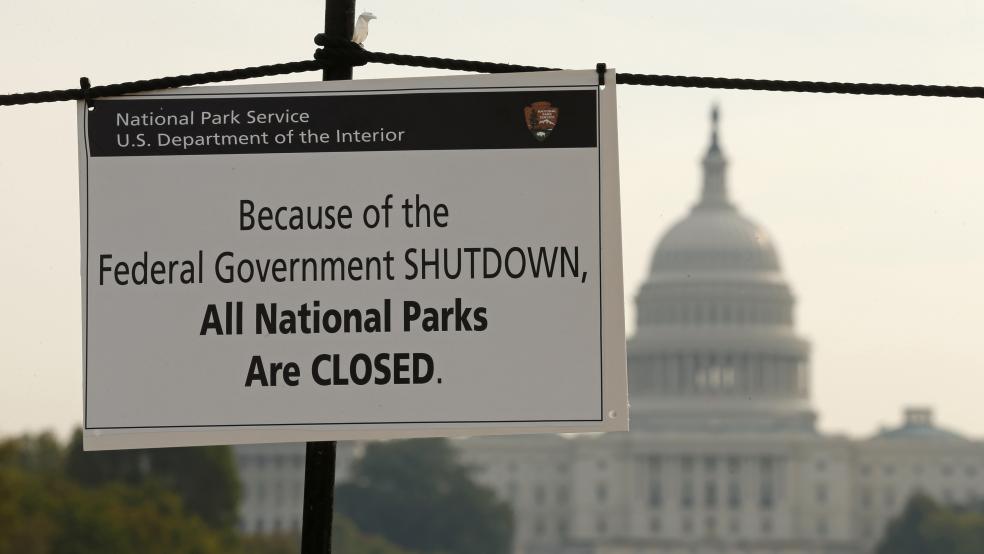House Speaker John Boehner’s abrupt resignation on Friday – less than a week before the start of a new fiscal year -- has sparked a crisis atmosphere and uncertainty on Capitol Hill that further fuels speculation about another government shutdown.
The odds were pretty high before today that Congress and President Obama would be unable to negotiate a deal for a short-term extension of funding authority to keep the government operating beyond midnight Wednesday – largely because several dozen far right conservatives in the House have refused to help pass any spending bill containing $550 million in subsidies for Planned Parenthood.
Related: After Boehner, Who Will Be the Next Speaker?
Bill Hoagland, a former Republican Senate budget adviser, said that even if Congress and the White House manage to agree on a short-term extension of spending in the next few days, the new Speaker has an overwhelming task before him.
“For the next Speaker, he’s going to have a huge, huge problem,” Hoagland said in an interview. “With the debt limit, with the expiring continuing resolution, with tax extenders, the highway bill – you almost understand why Boehner said to hell with it, I’m out of here. How that next Speaker makes a silk purse out of a sow’s ear come December is going to be extremely difficult.”
Hoagland, a top official with the Bipartisan Policy Center, noted that the Freedom Caucus – the conservative Republicans who helped force Boehner out – “is going to be even more powerful in terms of what happens with the next negotiations.”
“This resets everything,” added Todd Harrison, director of defense budget analysis at the Center for Strategic and International Studies.
Related: Why Boehner’s Resignation Could Be Bad for the Market
Boehner (R-OH) and Senate Majority Leader Mitch McConnell (R-KY) thought they might have a way out of the bind by pursuing a duel track and offering up two separate continuing resolutions to keep the government operating. One would allow the Planned Parenthood funding and one would deny it, giving anti-abortion forces the opportunity to vote against funding the organization in the wake of videos showing officials discussing the sale and disposal of aborted fetal body parts and tissue.
However, some conservative House and Senate members balked at this approach, saying it would be little more than a show vote that would allow spending for Planned Parenthood to be retained in the continuing resolution.?
Rep. Mick Mulvaney (R-SC), who signed a letter opposing any measure containing funding for Planned Parenthood, told The Washington Post yesterday, “I have not changed my mind about anything.”
Boehner has spent the last four years negotiating with the White House and Democrats with a gun to his head held by angry conservatives who were spoiling for fights with Obama over an array of issues, from funding of the Affordable Care Act to the U.S.-Iran nuclear deal to the current dustup over Planned Parenthood. With members of the now dominant right wing group called the Freedom Caucus now likely celebrating the speaker’s decision to resign, some of them may be energized to continue the fight with the administration – even if it means the second government shutdown in two years.
Related: Countdown to Yet Another Government Shutdown?
House Minority Leader Nancy Pelosi (D-CA) expressed shock and disappointment this morning that Boehner may have been forced from the speakership, and warned that the path to a short-term and long-term budget deal for the coming fiscal year just got a lot harder.
She said the resignation was a stark sign of “the disarray” among House Republicans and “a demonstration of their obsession with shutting down government at the expense of women’s health.”
Obama’s $3.99 trillion overall budget for fiscal 2016 would lift the automatic spending caps imposed by the 2011 Budget Control Act and provide for an additional $37 billion in domestic spending, including more for child care, health and college assistance, and a similar increase for defense spending to battle ISIS and address Russian aggression in the Ukraine. Congressional Republicans support raising the cap on defense spending but have opposed doing the same for domestic programs.
Related: Cutting Planned Parenthood Could Cost Taxpayers $130 Million
Obama is digging in his heels on the budget – both in opposing any cuts in Planned Parenthood but also insisting on substantially more for his prized domestic initiatives. Whoever succeeds Boehner as speaker will inherit the task of negotiating the final deal later this year.
Those talks would have to determine what the “top line” overall spending would be, how to finance the additional spending or make offsetting cuts in other programs and amendments or riders by Nov. 20, according to Pelosi.
Harrison said Boehner’s resignation makes the prospects of such far-reaching deals even taking place “very uncertain” as “it’s not clear who the negotiating partners would be” to cut the deal.
Pelosi said that Boehner’s resignation would be “more than a distraction” from achieving a final budget deal, but that much will depend on how well his successor can work with the White House, Senate leaders and rank and file members.
Moreover, she said, Republicans may feel public pressure to work out a final agreement without a government shutdown.






